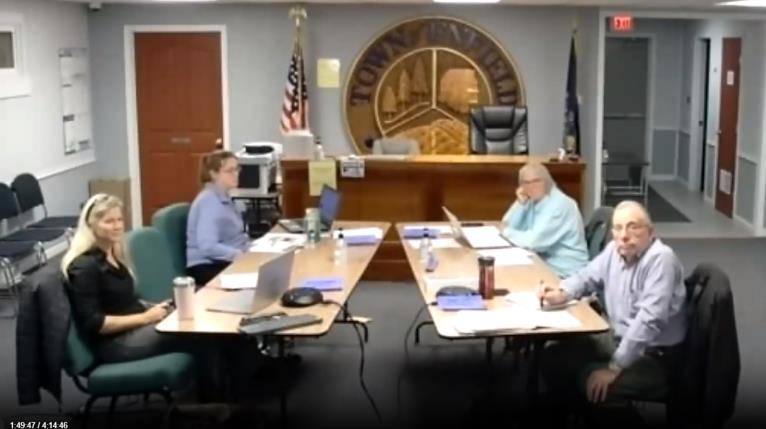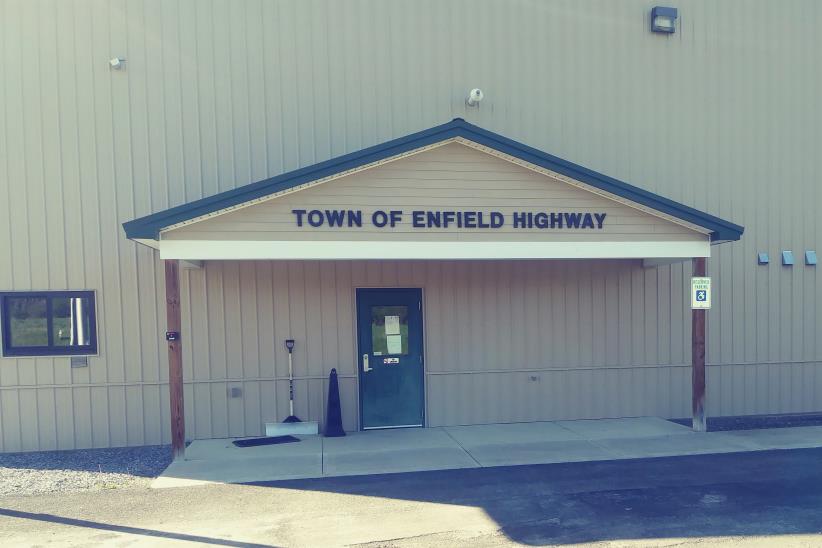Sand for Salaries; Enfield Board horse-trades during first-round budget review
by Councilperson Robert Lynch; October 18, 2023
Enfield Highway Superintendent Barry “Buddy” Rollins went into an October 11th Town Board meeting seeking better pay for both himself and his work crew. He got it, but at a price. In exchange for an additional one per cent salary increase, Rollins gave up $20,000 in budgeted sand purchases and another $10,000 in road materials. It was win-win for both sides. The deal shaved a bit off Enfield’s tentative 2024 budget and edged downward a feared 11.44 per cent property tax increase, a prospect that has dogged Town Board members since Supervisor Stephanie Redmond first unveiled the tentative spending plan earlier this month.

Rollins’ and the Town Board’s agreements came on the fly, made without much pre-planning or stagecraft. The Superintendent tendered his offer. Board members quickly accepted, this Councilperson at one point moving an amendment within seconds to embrace its terms. Wednesday’s was a budget meeting like that. Board members chipped away at little things when they could. They left other, more daunting items for later. Budgets that bewilder have a way of doing that.
“We made a lot of progress,” this Councilperson, Robert Lynch, told Town Board colleagues, following their laborious, 90-minute, line-by-line review of Supervisor Redmond’s next year’s budget draft, a $2.33 Million tentative package offering no frills, yet carrying a bottom line that’s larger than logic would predict.
“We made a lot of progress,” Redmond acknowledged, but we’re still not in the single-digits.”
“But we settled some things that needed to be settled,” I responded.
In terms of aggregate property value, Enfield stands in the cellar; the poorest town in Tompkins County. And because of that dubious distinction, the increasing costs of employee medical insurance, state-mandated pension premiums, and inglorious things like that have a tendency to leverage municipal burdens more heavily here than elsewhere. Town bookkeeper Blixy Taetzsch budgets conservatively. She says she estimates inexact expenses on the high side; treats revenues pessimistically. Supervisor Redmond claims that just $30,000 in added spending can hike the tax levy by one per cent. My math tells me just $20,000 will make that happen.
Expect the Enfield Town Board to complete its revisions to Redmond’s budget at a special meeting October 25th and then elevate it to a “Preliminary Budget.” After that, the Town Board will hold a Public Hearing November 8th and then could make the budget final.
A couple big-ticket budget lines remain unsettled. And one of them could raise the Highway Superintendent’s ire. But as far as salaries are concerned, Wednesday, the 11th was a good night for Buddy Rollins. It bode well for Town Clerk Mary Cornell as well.
“I would like it so that Buddy’s men would get a good message out of tonight’s meeting,” this Councilperson told the Town Board. Within seconds, a unanimous, four-member Town Board adopted a three-part plan whereby the Highway Department’s staff would see pay rise next year by the five per cent Rollins had requested in exchange for a $20,000 cut in the purchase of road sand a $10,000 reduction in buying road materials, like gravel. Redmond’s budget had offered the Highway crew only four per cent raises.
For the Town, the deal proved a bargain. Taetzsch calculated the added one per cent raise would only add $3,000 to expenditures. Because of that, the Board also proposed a raise for Town Clerk Mary Cornell, to elevate her pay by a similar five per cent. For Cornell, Redmond had only budgeted a three per cent raise.
“I can afford to lose sand money next year because we’re in pretty good shape with sand,” Rollins told the Board.
“It’s not a heavy lift, but it means a lot to the individual,” bookkeeper Taetzsch observed regarding the employee raises the Board had authorized.

“How much will mine be?” Rollins interjected, curious why the Board hadn’t yet moved to award him a five per cent raise to match that of his men. “What’s one per cent on me?” he inquired.
The inquiry led to the second deal of the night. The Town Board tapped $2000 from a seasonal work account to award both Rollins and Cornell their raises, which for Rollins would up his salary by about $800.
Last year’s raises were much more generous. Amid spiraling inflation, Enfield granted both Rollins and his crew pay hikes of 12 per cent. The Board then acted in an effort to keep Highway pay competitive with that in other towns and to prevent workers from seeking work elsewhere.
Yet despite these instant successes, Supervisor Redmond warned that the tax levy could still rise by double-digits next year unless something more were accomplished. Last year’s levy rose by 8.5 per cent. And while few on the Board expect to improve on last year’s numbers, a nine per cent increase emerged last Wednesday night as the consensus target tax increase to seek for 2024.
Dealt with briefly, yet inconclusively, and held over for discussion at the later meeting was a matter that could render short-lived the collegiality initially observed between Rollins and the Board. It involves a hefty increase in the Highway Department’s equipment line, including the Superintendent’s own request for a new pickup truck.
Rollins had sought $200,000 for new departmental equipment. That was up $80,000 from what was granted his department for 2023. In drafting her new budget, Redmond had trimmed the equipment increase to $50,000. Yet during Board deliberations, Rollins confirmed he’d like to spend $30,000 of the increase to swap-out his current pickup for a new model. That’s even though the heavy-duty Chevy he drives now was bought just three years ago. He’s priced a replacement at $71 Grand.
“The pickup’s due to be turned over next year, every three years,” Rollins advised the Board.
“We need to turn the pickup over every three years?” Councilperson Jude Lemke questioned.
“Everybody does three-to-four years,” the Superintendent responded.
“That truck’s in excellent shape,” I remarked.
“The reason that we go with the three-to-four year schedule is the depreciation becomes so low after that point that you get nothing for it,” Redmond interjected, the Supervisor maintaining that a three-year trade-in catches resale value at the sweet spot.
Of course, most Enfield taxpayers are not car dealers or accountants. So the Rollins-Redmond logic may be lost on them.
“Get off the pickup truck,” an irritated Buddy Rollins chastised the Board and particularly this Councilperson, “because I haven’t decided to do that yet (buy the pickup). That’s up for discussion.”
Discussion, perhaps, but not discussion that night. The Board postponed the Highway Superintendent’s equipment decisions for two more weeks.
Yet the Highway Superintendent’s preference for swapping out equipment will face its second, Town Board test in another roundabout way October 25th. This second decision won’t directly impact the 2024 budget. But since all public money is fungible, indirectly, of course, it will.
In an email sprung on Town Board members the evening before Wednesday’s meeting, Rollins proposed two purchases: a $230,000 material loader and also a backhoe costing close to $143,000. Each would replace machines respectively four and 13 years old. With trade-in allowances, the combined purchase would cost Enfield taxpayers over $171,000. Neither acquisition is listed on the Town of Enfield’s Capital Plan, a document written in 2019, yet never updated since Supervisor Beth McGee left office.

“They’re a heck of a deal,” Rollins described the Milton CAT dealer’s twin offers to the Board. The trade would mean the Town had got use of its current loader for just $65,000 over a five year span. “That’s $1,000 a month,” the Superintendent calculated. “We can’t rent a machine like that a day for $1,000.”
But this Councilperson—as he did with an earlier equipment purchase last April—pointed to the Capital Plan’s failure to account for such rotations or for it to state when it’s time to trade-in.
“I will repeat what I said last April,” I told Rollins. “Where is all this in the Capital Plan? It’s not there.”
“No, it’s not,” the Superintendent acknowledged. But Rollins made clear he didn’t really think it needed to be.
“With the loader, we’ve rotated that out before,” Rollins said, reportedly twice before since 2015. The Superintendent pressed for quick Board action that night on the money transfers, warning the CAT salesman’s quote is only good for 30 days.
“And if it doesn’t happen in 30 days, he’ll probably do the same thing for another 30 days, if they want the sale that badly,” I answered.
Maybe the machinery will go elsewhere, Rollins suggested.
“Well, then another machine will come along,” I predicted.
“Bob, I run the Highway Department,” Rollins fired back.
“And I’m on the Town Board,” I replied, equally emphatically.
“Good for you.” Rollins said.
At that point, Supervisor Redmond intervened.
During the discussion, Councilperson Jude Lemke acknowledged that updating the Capital Plan would hold benefits. “It’s useful having a sense of what’s coming down the road,” Lemke opined. Nonetheless, she conceded, “If you put a Capital Plan together, you’re not going to stick to it 100 per cent.”
Disagreements aside, it stands likely that Superintendent Rollins will later this month get the authorizations he seeks to buy the equipment he wants. “I can’t imagine we won’t go through with this,” Supervisor Redmond predicted.
Agree, sometimes; disagree, sometimes. It’s budget time.
###

